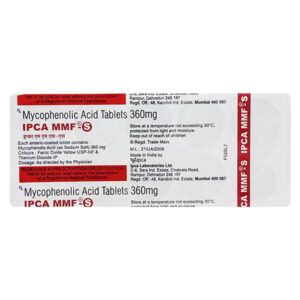MYCOPHENOLATE
MYCOPHENOLATE: Mycophenolate is a drug that is commonly used in transplant medicine to prevent rejection of transplanted organs. It is available in two forms, mycophenolate sodium and mycophenolate mofetil.
Mycophenolate works by inhibiting the production of DNA and RNA in immune cells, which helps to suppress the immune system and prevent it from attacking the transplanted organ. This drug specifically targets the enzyme inosine monophosphate dehydrogenase (IMPDH), which is vital for the proliferation of lymphocytes, a type of immune cell involved in rejection.
The dose of mycophenolate varies depending on the patient’s age, weight, and specific transplant organ. It is usually taken orally, with or without food. However, it is important to follow the prescribed dose and schedule provided by the healthcare provider.
As with any medication, mycophenolate can cause side effects. Some common side effects include nausea, vomiting, diarrhea, abdominal pain, and loss of appetite. These gastrointestinal symptoms are usually manageable and tend to improve with time. Other side effects may include headache, dizziness, fatigue, tremors, and an increased risk of infections. Patients taking mycophenolate should be closely monitored for signs of infection and may be prescribed additional medications to prevent and treat infections.
It is important to note that mycophenolate can cause birth defects and should not be used during pregnancy. Females of reproductive age who are taking this drug should use effective contraception and discuss family planning with their healthcare provider.
Mycophenolate may interact with other medications, so it is crucial to inform the healthcare provider about all other medications being taken, including over-the-counter drugs and supplements.
Overall, mycophenolate is a valuable immunosuppressive drug used in transplant medicine to prevent rejection of transplanted organs. It has a well-defined mechanism of action, dose regimen, and possible side effects that should be carefully considered and monitored during treatment.

